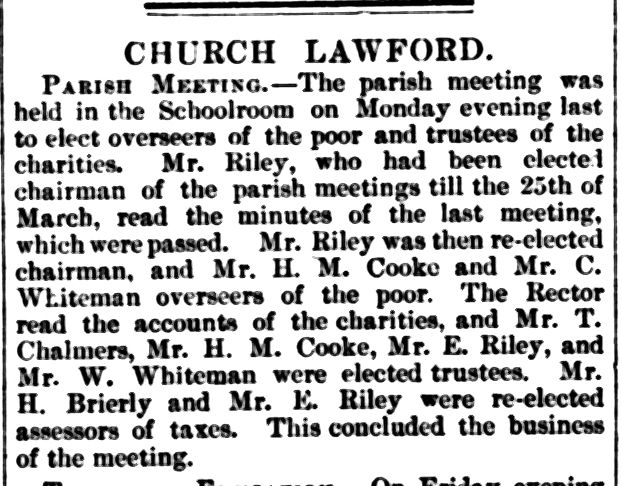Over the years the Parish would have various Parish Officers, possibly including a Parish Clerk, Overseers, Surveyors and a village Constable. These would complement any Manorial roles appointed by the Lord of the Manor. The various parish roles were usually the responsibility of local farmers or tradesmen. An excellent resource discussing these various Parish and Manorial Roles is at https://media.nationalarchives.gov.uk/index.php/the-parish-administration-and-records/
Overseers of the Poor
Two parishioners would be elected as overseers of the poor, who would collect rates from their fellow parishioners in order to provide relief to anyone in need, pay for pauper funerals and ensure able bodied poor people were provided with work. The overseers continued in their role into the 20th century, with valuation books recording the Parish Rate applicable to the various properties in the two villages. The valuation from 1919 is detailed here. A sample of the Overseers log from back in the Eighteen Century shows the sort of activities undertaken to support those in need.
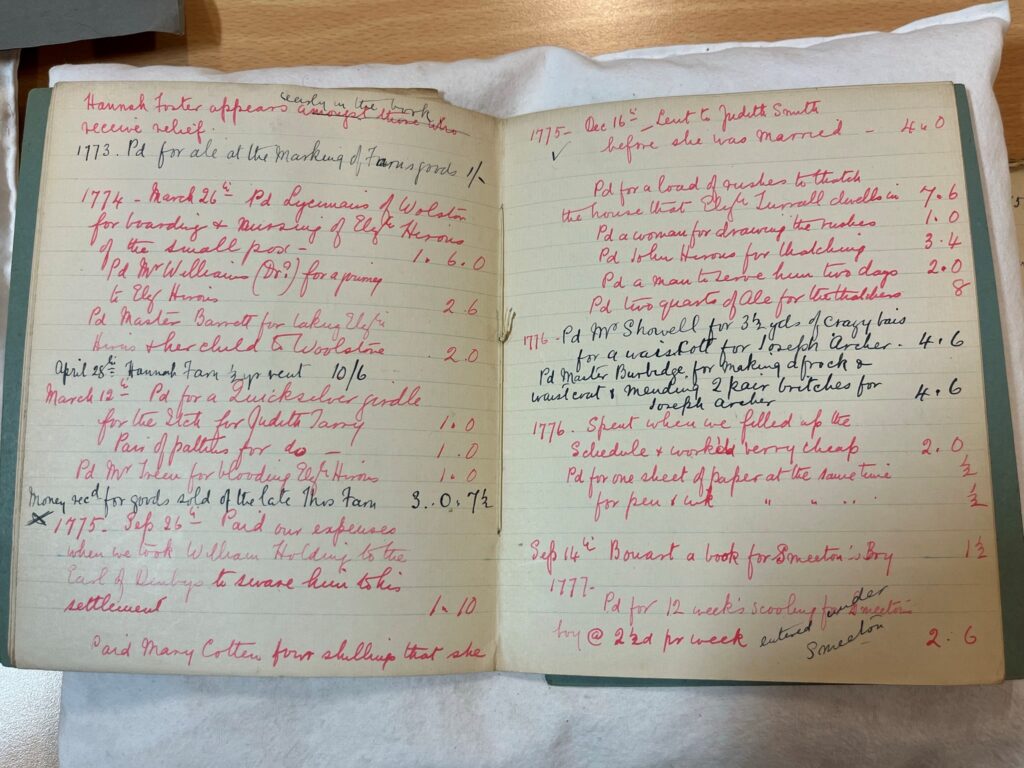
Church Wardens
Another key role in the Parish was that of the Church Warden, with a wide range of roles linked to the church. Prior to the introduction of Parish Councils in 1894 the parish committee known as the Vestry would set various charges in the parish, as well as appointing the Church Warden and the Overseers and recording support given to the poor in the Vestry book. In addition to the one or two Church Wardens there may have been one or more Sextons, responsible for the upkeep of the grounds of the church, including the graveyard, and also a verger who would organise and administer services and the inside of the church.
Parish Clerk
The Parish Clerk role changed quite significantly over the years, with initial focus being to the Church, but more recent focus has been split between the Parish Council and the Parochial Church Council. In the Nineteenth Century the role was discussed in some depth in a article by John Neale – see this link.
Villagers such as Joseph Mann had the role for 27 years in the middle of the nineteenth century, followed by Walter Cooke who took on the role for 29 years – see the initial obituary from the Rugby Advertiser in 1898 – he also acted as an overseer of the poor for many years, as well as the agent for the Newspaper, so a longer obituary followed.

Arthur Cooke took over the role after his father stood down from the role due to poor health. Charles Whiteman then took on the role in 1894, followed by Walter Pyniger for a short period, followed by John Pincham. Alf Day then took on the role in 1924 and held that role for almost 50 years.
Village Constable
The Village Constable role was more than just a simple peacekeeping role. The constable was also known as the Petty Constable, and a single person (typically male) was appointed for a year to operate at the Parish level. It is not too clear whether Church Lawford would have a separate constable – there are certainly records from Kings Newnham for this role – see below. The constable would deliver people to the courthouse, control the local stocks, collect taxes and rates from villagers, deal with church non-attendance, attend inquests and trials, deal with vagrants and maintain lists of potential jurors. The peace-keeping role also extended to managing a village militia if one was required. More mundane jobs including paying the local mole catcher, as can be seen in the summary below for the Kings Newnham Constable, with the right hand page showing those that were being taxed to fund the constable’s expenses.
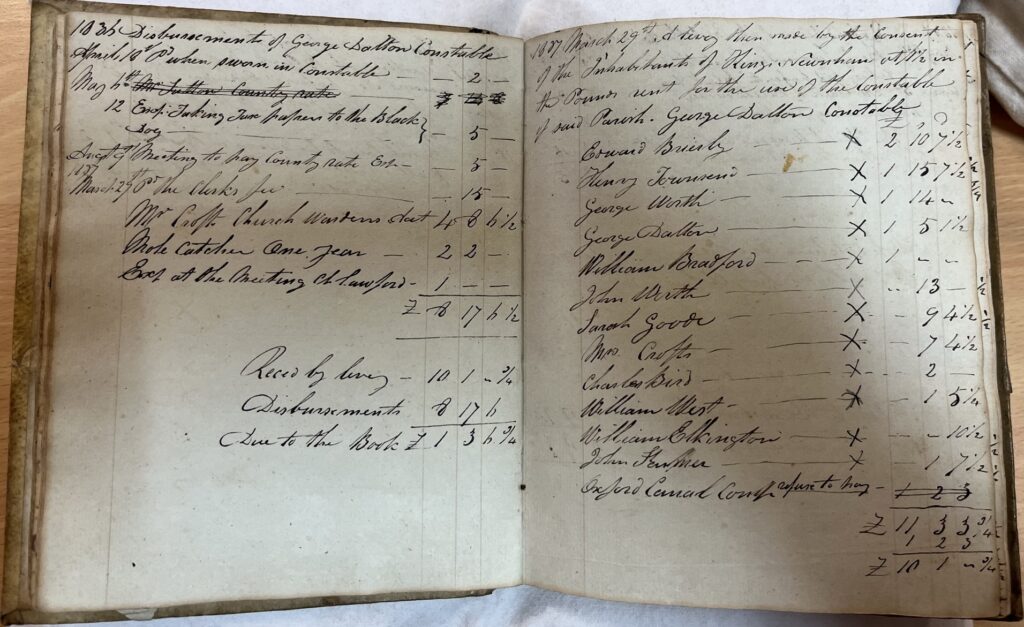
Surveyor
The Surveyor was elected to report on road conditions and maintenance work carried out. He was unpaid and obliged to survey the highways in the parish three times a year and control the labour that the landowner adjacent to the highway was obliged to provide to resolve any issues.
For example, in 1876 the elected surveyor was William James Crofts (Rookery Farm) for Church Lawford, and for Kings Newnham William H W Townsend and George Hill (both Farmers) shared the roles. At the same time four others acted as overseers of the poor – Harry Brierly Jr (Farmer) and Walter Cooke (Wheelwright) for Church Lawford, with John Brierly and William Bradford (both farmers) for Kings Newnham.
The appointments were confirmed at the local Petty Sessions – as seen here for the 1872 appointments:
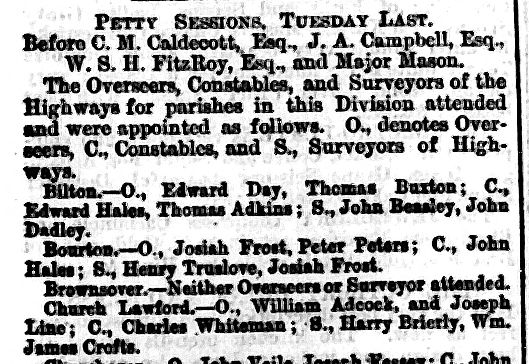

Further back in 1862 the appointments for the whole area also show the presence of the Townsend family in other districts, notably Clifton and Hillmorton.
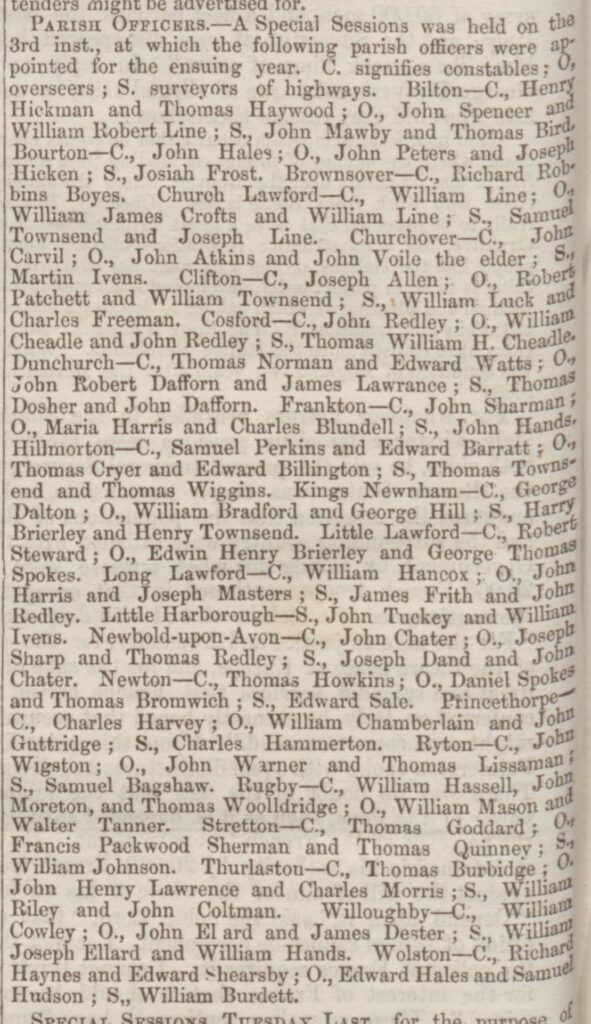
Village Alms House
For a relatively short period there was a village Alms House, known as Haven House, in Church Lawford, sheltering a small number of local widows, during the latter part of the 19th century, although increasingly Parish relief was given to those in need while they remained in their existing homes. This was distinct from the Rugby Poor Law Union, formed in 1836, which provided a centralised workhouse facility to the local parishes – see this link.
